Introduction
The Olympic Games are more than just a sporting event; they are a testament to the extraordinary power of the human spirit. Throughout history, the Olympics have given us moments that transcended sports, shifting cultural paradigms, inspiring nations, and igniting our belief in the impossible. In this article, we’ll delve into 15 of the most iconic and unforgettable Olympic moments that captured the world’s attention.
Top 15 Most Iconic Olympic Moments in History
- Jesse Owens defies Hitler’s regime (1936 Berlin Olympics)
- Abebe Bikila wins marathon barefoot (1960 Rome Olympics)
- Bob Beamon shatters the long jump world record (1968 Mexico City Olympics)
- Black Power salute (1968 Mexico City Olympics)
- Nadia Comăneci scores the first perfect 10 in gymnastics (1976 Montreal Olympics)
- The Miracle on Ice (1980 Lake Placid Olympics)
- Derek Redmond’s courageous finish (1992 Barcelona Olympics)
- Kerri Strug’s vault on an injured ankle (1996 Atlanta Olympics)
- Cathy Freeman lights the Olympic flame (2000 Sydney Olympics)
- Eric Moussambani’s determined swim (2000 Sydney Olympics)
- Michael Phelps wins eight gold medals (2008 Beijing Olympics)
- Usain Bolt’s lightning-fast world records (2008 Beijing Olympics)
- Oscar Pistorius competes in both Olympics and Paralympics (2012 London Olympics)
- Simone Biles’ gymnastic dominance (2016 Rio Olympics)
- Refugee Olympic Team sends a message of hope (2016 Rio Olympics)
1. Jesse Owens defies Hitler’s regime (1936 Berlin Olympics)
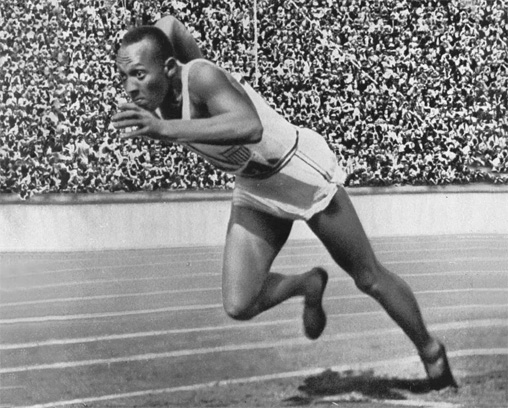
Jesse Owens, an African American track and field athlete, made history by winning four gold medals at the 1936 Berlin Olympics, held in Nazi Germany. His victories directly challenged Hitler’s propaganda of Aryan racial superiority, becoming a powerful symbol of triumph over adversity and a rejection of racist ideologies.
2. Abebe Bikila wins marathon barefoot (1960 Rome Olympics)
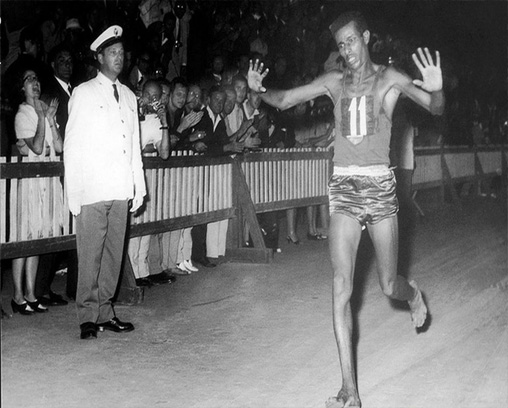
Ethiopian runner Abebe Bikila made Olympic history by winning the marathon barefoot at the 1960 Rome Olympics. A member of Ethiopia’s Imperial Guard, Bikila stunned the world and inspired future generations of African runners, showcasing the remarkable endurance and strength of his nation’s athletes.
3. Bob Beamon shatters the long jump world record (1968 Mexico City Olympics)
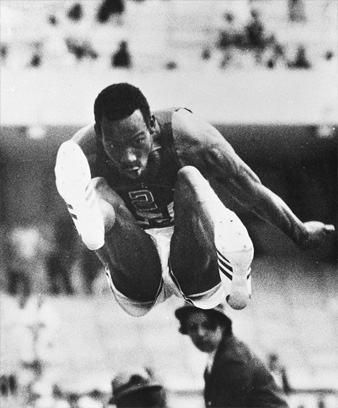
Image Source: wikipedia
American long jumper Bob Beamon achieved one of the most astounding feats in athletics history at the 1968 Mexico City Olympics. His jump of 8.90 meters (29 feet 2 ½ inches) surpassed the existing world record by a shocking 55 centimeters (21 inches), a record that stood for almost 23 years.
Read More: Discover the Latest Tech Innovations | Stay Ahead of the Curve
4. Black Power salute (1968 Mexico City Olympics)
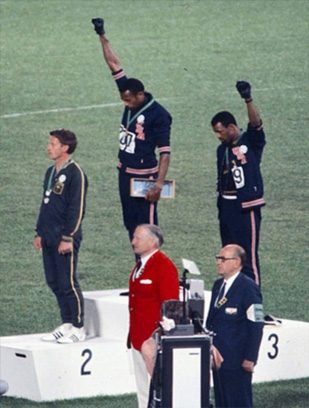
American sprinters Tommie Smith and John Carlos made a powerful statement against racial injustice on the medal podium at the 1968 Mexico City Olympics. Raising their fists in a Black Power salute during the US national anthem, they ignited controversy and sparked global discussions about race and equality.
5. Nadia Comăneci scores the first perfect 10 in gymnastics (1976 Montreal Olympics)
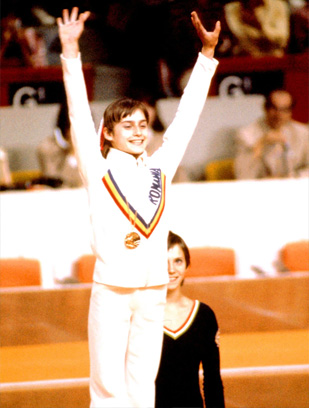
Romanian gymnast Nadia Comăneci made history when she received the first-ever perfect 10 score in Olympic gymnastics at the 1976 Montreal Games. At just 14, she captivated the world with flawless routines and became a gymnastics icon, redefining what was possible in her sport.
6. The Miracle on Ice (1980 Lake Placid Olympics)

Image Source: wikipedia Copyright by Sports Illustrated/Photographed by Heinz Kluetmeier
In one of the greatest upsets in sports history, a team of young American college hockey players defeated the heavily favored Soviet Union team at the 1980 Lake Placid Olympics. Known as the “Miracle on Ice,” this victory during the height of the Cold War became a symbol of American resilience and instilled a surge of national pride.
Read More: 15 Food Lies You’ve Been Fed – Time to Get the Facts
7. Derek Redmond’s courageous finish (1992 Barcelona Olympics)
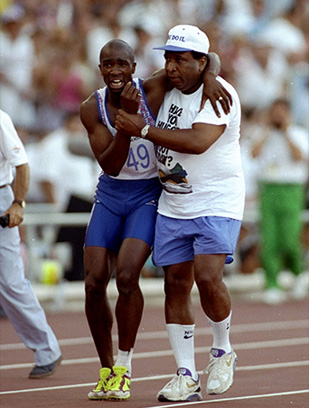
British runner Derek Redmond tore his hamstring during the 400-meter semi-final at the 1992 Barcelona Olympics. Determined to finish, he hobbled towards the line, aided by his father, who had rushed onto the track. The display of courage and the father-son bond moved spectators worldwide and became an enduring image of Olympic spirit.
8. Kerri Strug’s vault on an injured ankle (1996 Atlanta Olympics)
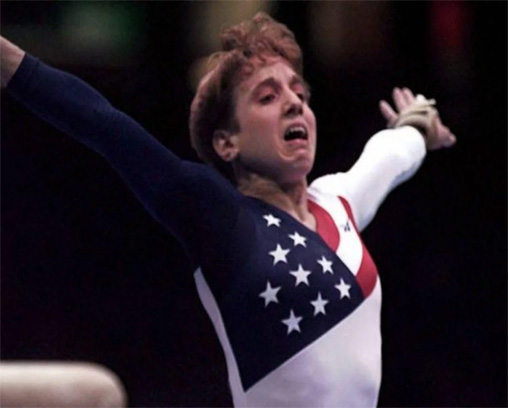
American gymnast Kerri Strug became a hero after landing a vault on a severely injured ankle to secure the team gold medal for the US at the 1996 Atlanta Olympics. Her sacrifice and unwavering determination solidified her place among the legends of Olympic gymnastics.
9. Cathy Freeman lights the Olympic flame (2000 Sydney Olympics)
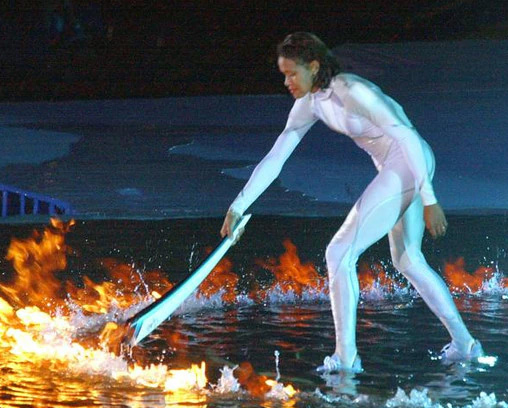
Australian Aboriginal athlete Cathy Freeman carried the Olympic torch and lit the cauldron at the 2000 Sydney Olympics. This symbolic moment signified hope, reconciliation, and pride for the Aboriginal people of Australia, sparking important conversations about the nation’s history and identity.
Read More: History’s Biggest Turning Points: Myths, Facts, and Unexpected Impacts
10. Eric Moussambani’s determined swim (2000 Sydney Olympics)
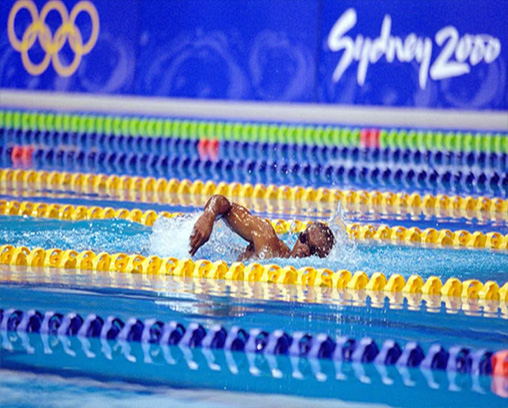
Eric Moussambani, a swimmer from Equatorial Guinea, captured hearts at the 2000 Sydney Olympics. Having only learned to swim months before and never having competed in a 50-meter pool, he struggled through his 100-meter freestyle heat. However, his sheer determination to finish the race symbolized the true spirit of Olympic participation.
11. Michael Phelps wins eight gold medals (2008 Beijing Olympics)
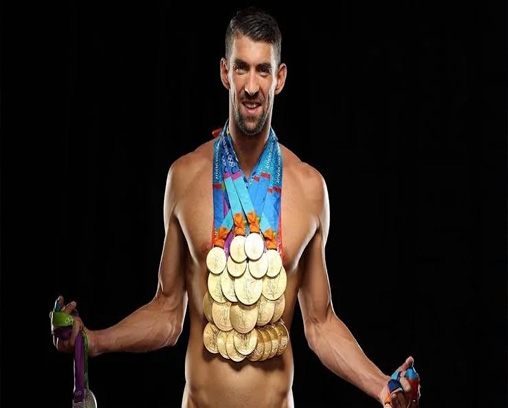
American swimmer Michael Phelps cemented his status as an Olympic legend by winning an unprecedented eight gold medals at the 2008 Beijing Olympics. His historic performance in the pool made him the most decorated Olympian of all time and redefined the limits of athletic achievement.
12. Usain Bolt’s lightning-fast world records (2008 Beijing Olympics)
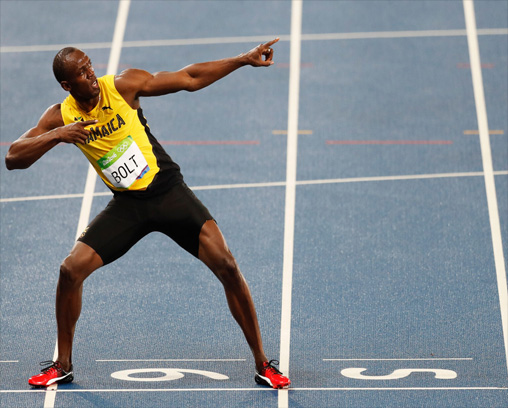
Jamaican sprinter Usain Bolt electrified the world with his record-breaking runs at the 2008 Beijing Olympics. Winning gold in both the 100-meter and 200-meter sprints with groundbreaking world record times, Bolt’s charismatic personality and dazzling speed made him a global icon.
Read More: From Flop to Favorite: 15 Movies That Were Initially Hated
13. Oscar Pistorius competes in both Olympics and Paralympics (2012 London Olympics)
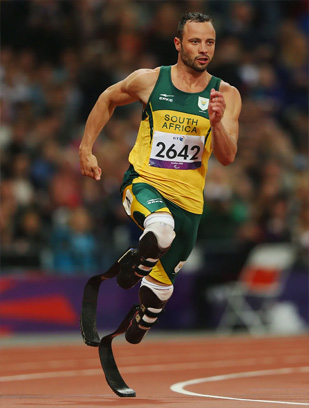
Image Source: britannica
South African runner Oscar Pistorius, known as the “Blade Runner,” competed in the 2012 London Olympics, becoming the first double-leg amputee to participate in the Games. His participation challenged perceptions of ability and broke down boundaries between the Olympics and Paralympics.
14. Simone Biles’ gymnastic dominance (2016 Rio Olympics)
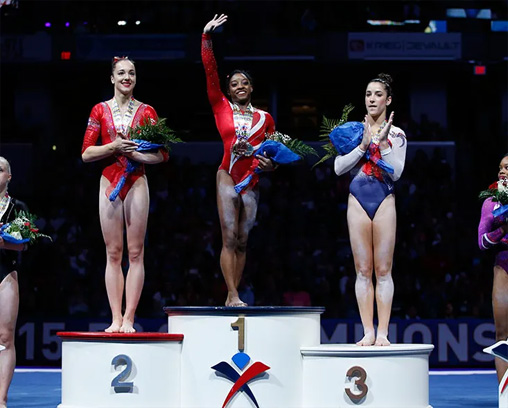
American gymnast Simone Biles dazzled the world with her gravity-defying feats on the gymnastics floor at the 2016 Rio Olympics, winning four gold medals. Her unparalleled skill and dominance cemented her place as one of the greatest gymnasts in history.
15. Refugee Olympic Team sends a message of hope (2016 Rio Olympics)
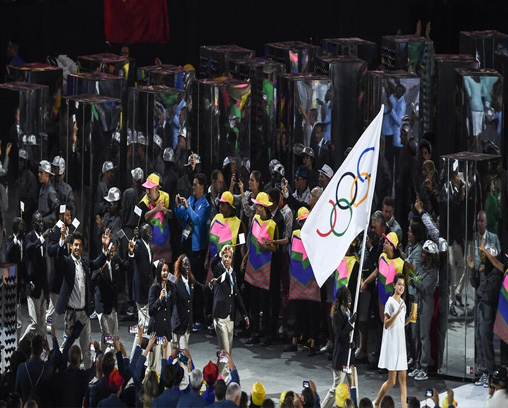
The first-ever Refugee Olympic Team debuted at the 2016 Rio Olympics, sending a powerful message of hope and resilience to refugees worldwide. Their participation highlighted the global refugee crisis and demonstrated the unifying power of the human spirit.
Conclusion:
These Olympic moments transcend mere athletic achievement. They are stories of courage, determination, and the unwavering power of the human spirit to overcome any obstacle. The Olympics provide us with a global stage to celebrate humanity at its best and inspire us to pursue our own greatness.
15 FAQs (Most Asked Questions):
-
Why are the Olympics so important beyond the sporting events?
The Olympics hold immense cultural power. They serve as a platform to break down barriers, promote peace and understanding, and celebrate the best of humanity. Iconic Olympic moments spark important conversations around social justice, equality, and resilience.
-
How have Olympic moments impacted social change?
Moments like Jesse Owens’ defiance of Nazi ideology, the Black Power salute in 1968, and Cathy Freeman’s representation of Aboriginal Australians have all shifted public discourse. These moments confront discrimination and push for greater acceptance and understanding.
-
How are Olympic legacies preserved?
The International Olympic Committee (IOC) and host cities work to preserve Olympic history through museums, archives, commemorative events, and educational programs. These efforts ensure that iconic moments continue to inspire future generations.
-
What makes an Olympic moment truly iconic?
Several factors contribute to an iconic moment:
Underdog triumphs: Overcoming adversity or a heavily favored opponent
Record-breaking performances: Shattering existing limitations
Displays of sportsmanship and courage: Going beyond the results
Connection to broader societal issues: Representing more than just athletic achievement -
How does technology impact the way we experience Olympic moments?
Advancements in broadcasting, slow-motion replays, and social media amplify the reach and immediacy of Olympic moments. This allows people across the globe to share these experiences in real-time, sparking global conversations and creating a shared sense of awe.
-
Can future Olympics create equally iconic moments?
Absolutely! Every Olympics offers the potential for new heroes, unexpected upsets, and stories that capture the human spirit. As sports evolve and societal issues shift, we’ll undoubtedly witness new defining moments in Olympic history.
-
Are there any controversial iconic Olympic moments?
Yes. Some moments, like the Black Power salute in 1968, were highly divisive at the time. Others, such as the judging controversies in gymnastics or figure skating, highlight the imperfections of competitive sports and can lead to revised rules and judging systems.
-
How can I learn more about Olympic history?
Here are some resources:
* The Olympic Museum website: https://olympics.com/museum
* Documentaries and films about Olympic athletes and events
* Books and articles on specific Olympic moments -
Are iconic Olympic moments limited to medal-winning performances?
Not at all! While medals often mark outstanding achievement, iconic moments can also include acts of sportsmanship, displays of perseverance in the face of setbacks, and even humorous incidents that capture the lighter side of the Games.
-
What role does the media play in shaping iconic Olympic moments?
The media plays a crucial role in amplifying and shaping the narrative around Olympic moments. Compelling storytelling, dramatic replays, and expert commentary help elevate these moments and make them resonate with a global audience.
-
Have there been iconic Olympic moments outside of the main competition events?
Yes! Opening and closing ceremonies often feature symbolic moments that represent the host nation’s culture and values or convey messages of unity. Examples include Cathy Freeman lighting the cauldron in Sydney or the dove release symbolizing peace.
-
Are Olympic moments from smaller nations less recognized?
Athletes from smaller nations can and do create iconic moments. Eric Moussambani’s determined swim is a prime example. These moments often highlight the spirit of participation and the power of the Olympics to unite athletes from all backgrounds.
-
Can negative events also become iconic Olympic moments?
Unfortunately, yes. Scandals, disqualifications, and tragedies can also etch themselves into Olympic history. These moments serve as cautionary tales and prompt reforms within governing bodies to ensure the integrity of the Games.
-
How do iconic Olympic moments inspire young athletes?
These moments showcase the pinnacle of sporting achievement and spark dreams in young athletes worldwide. They demonstrate the rewards of dedication, hard work, and the unwavering pursuit of excellence.
-
How can I relive my favorite iconic Olympic moments?
Many resources are available to revisit iconic moments:
* YouTube: Search for specific events or athletes.
* Official Olympic Channel: Features highlights and historical footage. (https://olympics.com/)
* Documentaries and Sports Films: Often delve deeply into iconic moments.




